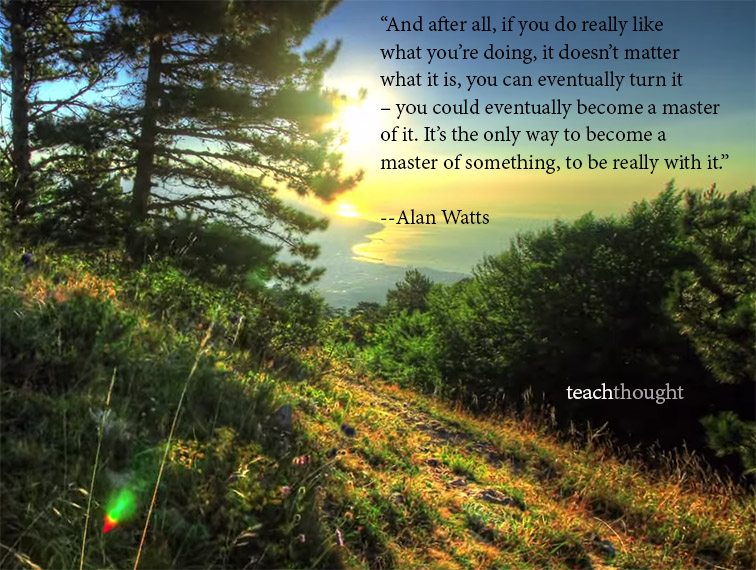
by TeachThought Staff
Alan Watts (b 1915, d. 1973) was a British philosopher and speaker who was interested in translating Eastern philosophy into English.
He frequently talked about Zen ideas–impermanence, thought, self, and other Zen-related thinking through the lens of day-to-day living. As a result, his language was more accessible than that of his peers. He eventually moved from England to San Francisco, where his ideas found roots in the 1960s.
He is most relevant to education in his focus on creativity, knowledge, and thought. In fact, you can hear a lot of his ideas in Ken Robinson’s talks. In the video, he talks about the idea of purpose, and how cycles can obscure them. (See bold text below.) There are takeaways here for education at large, both directly (What is the purpose of education?) and indirectly (Have we designed a system of teaching and learning that simply replicates the things that have come before?)
The idea of finding purpose through love and affection is a simple idea that’s not new, but seems to only exist through topical one-liners (Do what you love and you’ll never work!), and rarely through careful thinking.
Consider how foreign this kind of reflection is in our schools. In an industry that purports to produce “college and career ready” students, this is curious.

What Would You Like To Do If Money Were No Object?
“Let’s suppose, I do this often in vocational guidance of students, they come to me and say, well, “we’re getting out of college and we have the faintest idea what we want to do.” So I always ask the question, “What would you like to do if money were no object? How would you really enjoy spending your life?”
Well, it’s so amazing as a result of our kind of educational system, crowds of students say well, we’d like to be painters, we’d like to be poets, we’d like to be writers, but as everybody knows you can’t earn any money that way. Or another person says well, I’d like to live an out-of-doors life and ride horses. I said you want to teach in a riding school? Let’s go through with it. What do you want to do?
When we finally got down to something, which the individual says he really wants to do, I will say to him, ‘you do that and forget the money, because, if you say that getting the money is the most important thing, you will spend your life completely wasting your time. You’ll be doing things you don’t like doing in order to go on living, that is to go on doing things you don’t like doing, which is stupid. Better to have a short life that is full of what you like doing than a long life spent in a miserable way.
See also Alan Watts: Don’t Think Too Much
And after all, if you do really like what you’re doing, it doesn’t matter what it is, you can eventually turn it – you could eventually become a master of it. It’s the only way to become a master of something, to be really with it. And then you’ll be able to get a good fee for whatever it is. So don’t worry too much.’
That’s everybody is – somebody is interested in everything, anything you can be interested in, you will find others will. But it’s absolutely stupid to spend your time doing things you don’t like, in order to go on spending things you don’t like, doing things you don’t like and to teach our children to follow in the same track.
See what we are doing, is we’re bringing up children and educating to live the same sort of lives we are living. In order that they may justify themselves and find satisfaction in life by bringing up their children to bring up their children to do the same thing, so it’s all retch and no vomit. It never gets there.
And so, therefore, it’s so important to consider this question: What do I desire?”
Alan Watts On Purpose
